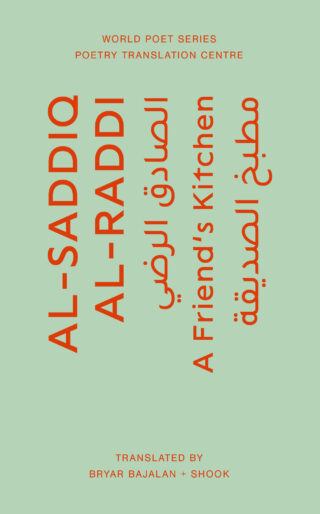
A Friend’s Kitchen, Al-Saddiq Al-Raddi, translated by Bryar Bajalan and Shook (Poetry Translation Centre), £9
I remember touring with Saddiq when both Gaarriye and Sarah Maguire were still alive (I was reading with Gaarriye as one of his co-translators), so reading this lovely collection with its distinctly elegiac overtones was a moving experience. The link with Gaarriye was for me reinforced by the complex archaeological hinterland Sudan and Somaliland share with ancient Egypt, something Saddiq explored in his residency at the The Petrie Museum, and gathered in a previous publication, He Tells Tales of Meroe (read the title poem here).
*
Al-Saddiq Al-Raddi’s new book manages to be several things at once. It’s certainly a political protestation, an act of resistance of the spirit to oppression in Sudan and to the pressures the UK places on political exiles. But it is at the same time an ecstatic, disorienting celebration of language and the imagination, and a raw, grieving set of eulogies to the loss of love, friendship and imaginative freedom. It has the pulse of Sufism, delighting in paradox and sudden insight: ‘Everything shouts: Hey Lonely!’, and it matches such moments to the sudden, almost dissonant clashes of a Dadaist sensibility: ‘At night’s end, the dress of a wolf emerges’.
In the introduction, Bryar Bajalan makes the subtle point that this technique is ‘designed to bypass his own self-censorship’ – an insight into how we internalise and must find strategies to resist coercive ideology. Bajalan describes this as stream-of-consciousness, but at points it seems as much stream-of-conscience. The voice is at once Al-Saddiq’s own, negotiating a painful isolation and a passionate affair in London, and that of anyone suffering physically and mentally under oppression – including, in the masterly ‘My Corpse in the River’, the voice of the dead. The loved one has, as might be expected, spiritual resonance, but is also flawed and fragile to the point of loss, ‘your wrong mouth in the right place’. There is a heart-rending image at the centre of ‘And You Don’t Return To Me’ in which ‘the ambulance dances’ as it passes out of sight for the last time.
In a echo of the self-protective tropes of other writers facing censorship and imprisonment, Al-Saddiq deploys subtle and riddling allegory to convey a sensibility as much as a message, establishing a landscape in which ‘the festive square’ of resistance can equate with the ‘festival’ between a lover’s thighs. Throughout, then, symbols such as ‘an orphan shadow’, or ‘the broken ladder at the fifth threshold’, or ‘a planetary kiss’ on a dark staircase, do powerful work. In this, we owe his translators a great debt, in that they manage successfully to convey what anyone who has heard him read knows is the dizzying rhetorical power and force of his Arabic; here, as he says,’The wall of language was no barrier’.
The book ends in a moving transition from the earlier ‘Book of Sorrows’ to ‘The Book of Erasures’, and a transcendence enacted through self-abnegation:
I will narrate nothing
I am busy sweeping away all traces of my existence
Nothing will be left!

